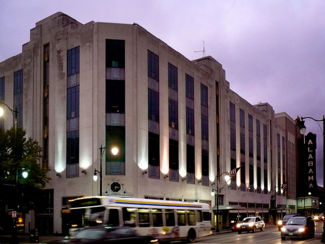McWane Science Center
The McWane Science Center is a non-profit hands-on science museum and research archive located at 200 19th Street North in downtown Birmingham. It first opened in 1998 after extensive renovations of the former Loveman's department store and the construction of an adjacent 280-seat IMAX Dome theater.
The center reported 428,820 visitors in 2008, making it the fourth-most popular admission-charging attraction in the state.
History
The McWane Science Center is named after the McWane family and McWane, Inc. both of which helped fund the center. It was the end result of a project begun shortly after the merging of the Red Mountain Museum and Discovery Place children's museum in 1991. The combined board began fund raising for a new museum with the working title of Discovery 2000. The site of the existing Red Mountain Museum was considered, but the difficulty of accommodating school buses and the city's reticence about upgrading the road cut walkway for handicapped accessibility made it clear that moving was the only option. With major funding from the owners of McWane, Inc., the McWane Center took its present form.
Exhibits
The McWane Science Center houses several permanent exhibits, including the 9,000 square-foot "ScienceQuest" interactive exhibit floor, the "World of Water" aquarium, the "Challanger Learning Center" space shuttle simulation, "Just Mice Size", a stimulating environment for young children.
In addition to the IMAX Dome theater, used for feature presentations, the McWane Science Center has the Rushton Science Theater for live multimedia presentations, wet labs for classroom-style teaching, and smaller seating areas for smaller demonstrations.
The "Alabama Collections Center" is the home for more than 500,000 artifacts from the former Red Mountain Museum. The center houses precious minerals, fossils and Native American artifacts. Highlights in the collection include the world's fourth-largest collection of mosasaurs; the Appalachiosaurus (the Alabama Tyrannosaurus); and the state fossil of Alabama, the Basilosaurus (an 80 foot fossil whale).
References
- McWane Science Center. (2007, March 7). In Wikipedia, The Free Encyclopedia. Retrieved 18:15, July 9, 2007 [1]
- Williams, Roy L. (March 3, 2009) "Space & Rocket Center tops list of state attractions, tourism agency says." Birmingham News
External links
| Dual licensed with the Creative Commons Attribution Share-Alike License version 3.0 | |
| This article is published under the GFDL and the Creative Commons Attribution Share-Alike license v3.0. | |
